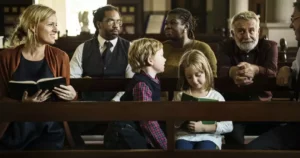I have known both these precious moms, Kate and Steph, for much of their lives. (See The No Mom and The Yes Mom) I remember the play dates, the accounts of playground princess games and their mutual love for Jesus. Both fathers were – and are – in full time ministry, so both in a way are PKs (preacher’s kids). I have watched (from a distance with Steph) as they made their way through school, years of tertiary study, courtship, engagements and weddings, and now as they navigate the early years of motherhood. As Steph implies, there is no ‘one size fits all’ manual for child-raising but there are thousands of manuals out there, all with a different slant, claiming to have the best insights into this high calling of motherhood. Both the ‘Yes moms’ and the ‘No moms’ will be able to find plenty of literature to support their particular persuasions.
So I suppose I am a ‘Yes/No Mom’ – which we all are really, but it’s all about what we say ‘Yes’ to and what we say ‘No’ to.
Here are a few of my thoughts – which I offer here, both from my own experience and from the wonderful vantage point of hindsight (which neither of them has just yet!) There will always be things we regret about the way we raised our children – things we wished we had done or had not done, or had done better. That is one of the reasons why the Bible enjoins young women to listen to the counsel and experiences of godly, older women who have walked the road before them. This practice I fear, is sadly lacking, either because it is too often assumed that these older women hold to seriously outdated ideas and are out of touch with the world their children are growing up in. Perhaps it could also be that there is a tragic dearth of godly older women…
That being said, I have to acknowledge that we definitely are from another era: we come from the pre-cell phone, pre internet, pre social media age, BUT in the principles of life and godliness, I have to assert – with King Solomon – that there is ‘nothing new under the sun’ (Ecclesiastes 1:9), especially when it comes to human nature, our bent towards sin and God’s way. God is the same yesterday, today and forever – and in His Word, we can find the infinitely wise, perfect-in-love principles He has given all of us for life.
So, let me risk much rolling of eyes and quote perhaps the MOST quoted verse in the Bible concerning child-raising:
‘Train up a child in the way he should go and when he is old, he will not depart from it’. (Proverbs 22:6)
This is a scriptural injunction – which means it is something that God (through the writer) is exhorting us – perhaps even commanding us – to do. Without training, therefore, a well-functioning, well-adjusted, even pleasant child is not miraculously going to emerge.
So why are we exhorted to train the children we are blessed and entrusted with? What are we training them for? We are training our children for the exciting, difficult, unpredictable, fun-sprinkled, fear-filled, joy-punctuated yet tragedy-laced path of life. For this we are encouraged to train them. Physical training involves hard work, repetitive exercises, discipline, hardship, discomfort and even deprivation at times – but the result is a well-functioning body, trained to excel at certain disciplines. The outcome is always to be held in mind. It is the same with training a child. So, ask yourselves, mommies, what outcome do you desire? What way do you long for your child to walk in? This will determine what you say ‘Yes’ to and when you will say ‘No’.
When you imagine or picture your adult child (stop and do this for a second), what do you see? A confident, well-adjusted, loving parent with his/her own children, holding down a successful job? (We all picture this, don’t we?!) Or do we see an emotionally unstable, fearful, young adult with a path of pain behind him/her? Though there are ALWAYS going to be factors completely out of our control and we ALL make mistakes, neither of the above pictures just ‘happens’.
Let me suggest what God indicates we should desire to see in our children – what He desires to see.
1. Godliness
It should be our foremost desire to see our children become children of the living God – not idolised football stars, multi-millionaires or feted earth-shakers, but children of God. We have the indescribable privilege and responsibility of introducing them to the Lord, and modelling and encouraging them to sustain an enduring relationship with their Maker. They will NOT simply just gravitate towards God by themselves. Therefore, our first responsibility is to introduce them to Jesus, not only in our words and teaching, but in the way we live. Model Jesus to your children. (Not easy!) This means they should learn grace, truth, right and wrong, and above all love, from you. With this in mind, there will be things you will be saying a delighted ‘Yes!’ to, and to others a definite ‘No’.
2. Obedience
Yes, I said that word. Obedience. Jesus said, ‘If you love me, you will obey my commandments.’ (John 14:15). So, obedience is an identifying mark of a child of God. You might argue that the command is to obey God, not man, but if they do not learn to submit to us, their parents, how will they ever learn to submit to the Lord, whom they have not seen? This is why children are told to ‘Obey their parents in the Lord, for this is right.’ (Ephesians 6:1 and Prov 6:20, 23:22, 30:17; Deut 21:18-21, 2 Tim 3:2 and PLENTY more!) So, we are to train them to respond in obedient submission to our commands. If they don’t learn to obey, their selfish ways will always be pursued and always condoned by us. These commands should not be burdensome, unreasonable or unnecessary, however. Establish a few good, sensible rules and expect obedience to them.
3. Selflessness, generosity and concern for others (Agape love)
This is perhaps one of the hardest lessons to teach a child, but it can be taught and modelled. Every child needs to be taught and shown selflessness (self-sacrificing love) because it doesn’t come naturally, and because this is perhaps the most Christ-like of all qualities. It was certainly a struggle in our home as I tried to persuade my daughters to part with even ‘pre-loved’ toys at Christmas!
4. Courtesy
Call me old-fashioned, but courtesy (politeness) and respect for others is a grace we are called to. ‘Do not think of yourself more highly than you ought’ (Romans 12:3) and ‘in humility count others as more significant than you.’ (Phil 2:3). We are always to treat others as if they are more important than us! And this involves giving them respect, honouring them and being polite. This is an area in which I acknowledge a level of failure. In hindsight, I truly wish I had insisted that my children address adults as Mr and Mrs Whoever, instead of allowing them to speak to 30 to 80 year olds in our church by their first names (which these dear people often encouraged them to do.) Kate’s overconfidence with adults, bordering on precociousness at times, and not ‘knowing her place’ in mixed age company was something she struggled with for many years – and which got her into some really difficult situations at times.
5. Gratitude
Give thanks to the Lord often in their presence so they will learn to be grateful and rejoice at blessings. Always encourage them – in fact insist that they thank others. An ungrateful heart is an ugly heart.
Who would not want to be with a godly, obedient, selfless, courteous and grateful child? Older moms, does that describe the teenager living in your home at the moment? Don’t despair! If the foundation is there, they will return one day from the alien planet-of-one they are living on now!
There are MANY more qualities I could mention that we should long to see in our children and which we should be training them in, such as making an effort to discover the unique ways in which God has designed them, encouraging their passions, gifts and talents and leading them to glorify God in this pursuit. I totally agree with Steph too that we should cultivate a love of fun. Life is too short not to savour the opportunities (rarer as you get older) for good, clean fun! But these are just the few than spring immediately to mind.
So, in summary, I would suggest that the adult children we wish to see would be selfless, loving, resilient in hardship, able to cope with disappointment, obedient to authorities over them, able to operate wisely even when there are no rules in place and think for themselves. So we need always to keep this desired outcome in mind whenever we say ‘Yes’ or ‘No’.
In conclusion, I will limit my counsel to the ‘Yes’ and ‘No moms’ to one encouragement each. To the ‘Yes Mom’, my counsel would be: ‘Though learning through experience is necessary and valuable, don’t abdicate your responsibility to train your child’, and to the ‘No Mom’: ‘Be careful of imposing too many unnecessary rules on your child; it will break his/her spirit and breed resentment.’
And to all the moms out there, listen to godly older moms and learn from their experiences – good and bad. Consider too the values and lifestyle of those not raised according to God’s principles and decide exactly what young adults you wish to send out into the world. Mothering requires great humility and many hours on our knees in prayer. With the best intentions and efforts, and even through following all the principles above, there are no guarantees. God’s grace and His grace alone needs to be sought in this awesome responsibility.

Photo Credit: Sherilyn Hawley
Tags: Bible, child, children, command, commandment, courtesy, discipline, generosity, godliness, gratitude, Jesus, kids, love, mom, mommyhood, mother, motherhood, no, no om, obedience, parent, parenthood, selflessness, train, yes, yes mom





Leave a Reply